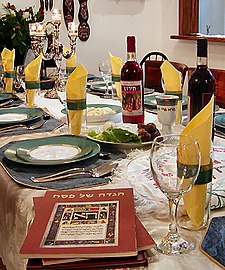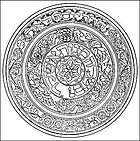Passover
Appearance
| Passover | |
|---|---|
 | |
| Official name | Hebrew:פסח(Pesach) |
| Observed by | JewsandSamaritans |
| Type | Jewish |
| Significance | Celebrates theExodus,the freedom fromslaveryof theChildren of Israelfromancient Egyptthat followed theTen Plagues. Beginning of the 49 days ofCounting of the Omer |
| Begins | 15th day ofNisan[1][2] |
| Ends | 21st day of Nisan inIsrael,and among some liberalDiaspora Jews;22nd day of Nisan outside ofIsraelamong more traditional Diaspora Jews.[3] |
| Celebrations | In Jewish practice, one or two festiveSedermeals – first two nights; in the times of theTemple in Jerusalem,thePassover sacrifice. In Samaritan practice, men gather for a religious ceremony onmount Gerizimthat includes the ancient lambsacrifice. |
| Related to | Shavuot( "Festival of Weeks" ) which follows 49 days from the second night of Passover. |
Passover(Hebrew:פסח,Pesach) is a religiousholidayorfestivalnoted by ceremonies each year byJewishpeople. They celebrate it to remember whenGodusedMosesto free theIsraelitesfromslaveryinEgypt,as told in the book ofExodusin theBible.[4]God told Moses to set aside this special week originally called "the feast ofunleavened bread".During this time, the people eat special foods, do specialritualsand sing songs. Passover starts on the 15th of Nisan on theHebrew calendar,which falls in March or April.
Second Passover
[change|change source]The "Second Passover" (Pesach Sheni) on the 15th of Iyar in the Hebrew Calendar is mentioned in the Hebrew Bible[5]as a make-up day for people who were unable to offer thePassover sacrificeat the appropriate time.
References
[change|change source]- ↑"First day of Passover".timeanddate.com.Retrieved2013-02-17.
- ↑"What Is Passover?".Rabbinical College of Australia and N.Z. Archived fromthe originalon 2012-08-05.Retrieved2013-02-17.
- ↑"Last day of Passover".timeanddate.com.Retrieved2013-02-17.
- ↑Exodus 3–15
- ↑Numbers 9

